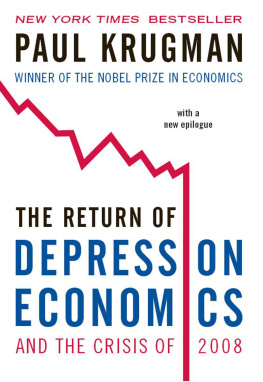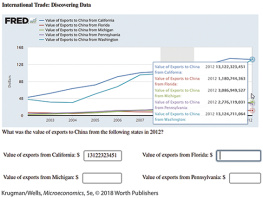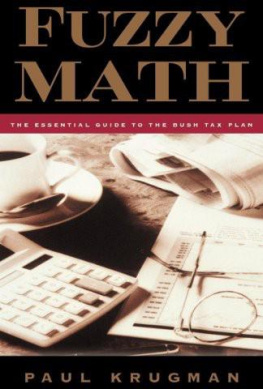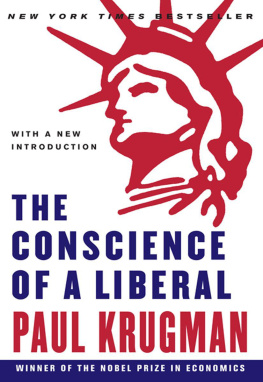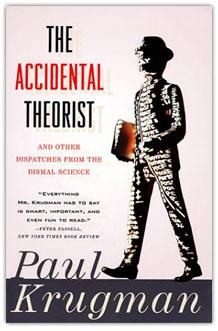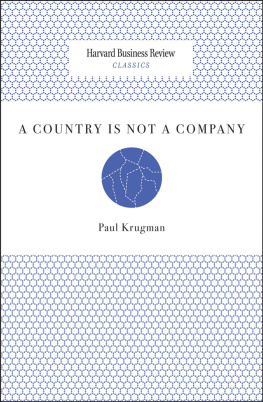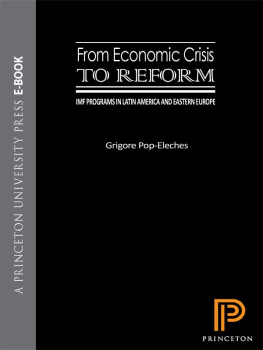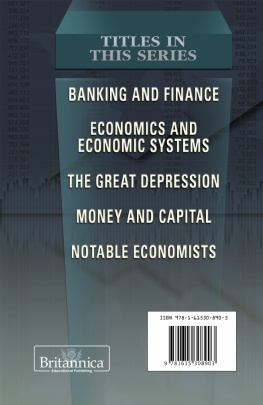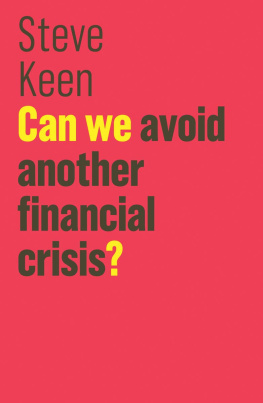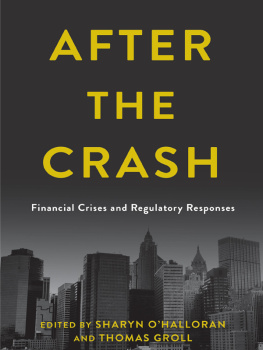More praise for
The Return of Depression Economics
and the Crisis of 2008
Nobody who writes about economics does it better than Paul Krugman.
Washington Post
Krugmans book is a call to action.
Jonathan Rabinovitz, San Jose Mercury News
Moving from concrete examples (e.g., the struggles of a Japanese baby-sitting coop) to stinging critiques of head-in-the-sand theorists, Krugman proves himself not only comprehensible but also well worth comprehending.
Publishers Weekly
This is a brilliant book, but it scares me, for several reasons. Krugman, a Nobel Prizewinning economist who specialises in recessions, takes us through the history of why they happen.
William Leith, The Guardian
To paraphrase biographer Richard Brookhisers observation about Alexander Hamilton, Paul Krugman is a know-it-all who actually does seem to know it all.
J. Peder Zane, The News & Observer
Reading Paul Krugman always makes me feel like a smarter person and a better citizen. As an economist with a common touch, he shares the ability with a couple of other specialized authorsStephen Jay Gould and Carl Saganto make clear some very complicated concepts from a specialized subject area, and to make the reader enjoy the experience.
Susan Gardner, Daily Kos
Columnist and academic Paul Krugman is God of All Economic Thought in some Democratic literary and political circles. This midsize volume shows why. Krugmans facility both with arcane details and with vast unified explanations boils down complexity so much that the reader often wonders: Why didnt I see it that way myself?Krugmans appeal, in this and the rest of his canon, lies in his gift at poking holes in economic cant and ideological explanations that dont fit real-world developments.
Ross Kerber, Boston Globe
Excellent. Reading Krugman as he glances over the economic history of the past several decades is both enjoyable and thought-provoking.
Floyd Norris, New York Times Book Review
A fascinating and extremely well written account of all the various booms and busts that our generation has witnessed. This short book cannot help but improve the readers understanding of the past 30 years of world economic history.
Edwin T. Burton, The Daily Progress
The man best able to explain the economic maelstrom.
San Francisco Chronicle
Almost certainly the worlds most famous economist.
Lionel Barber, The Financial Times
THE RETURN OF
DEPRESSION ECONOMICS
AND THE CRISIS OF 2008
ALSO BY PAUL KRUGMAN
The Conscience of a Liberal
The Great Unraveling
Fuzzy Math
The Accidental Theorist
Pop Internationalism
Peddling Prosperity
The Age of Diminished Expectations
Paul Krugman
THE RETURN OF
DEPRESSION ECONOMICS
AND THE CRISIS OF 2008

W. W. Norton & Company New York London
Copyright 2009, 1999 by Paul Krugman
All rights reserved
For information about permission to reproduce selections from this book, write to Permissions, W. W. Norton & Company, Inc.,
500 Fifth Avenue, New York, NY 10110
Library of Congress Cataloging-in-Publication Data
Krugman, Paul R.
The return of depression economics and the crisis of 2008 / Paul Krugman.
p. cm.
ISBN: 978-0-393-07120-7
1. RecessionsHistory21st century. 2. Business cyclesHistory21st century. 3. Financial crisesHistory21st century. 4. Depressions1929. I. Title.
HB3716.K77 2009
330.9dc22
2008048995
W. W. Norton & Company, Inc.
500 Fifth Avenue, New York, N.Y. 10110
www.wwnorton.com
W. W. Norton & Company Ltd.
Castle House, 75/76 Wells Street, London W1T 3QT
Contents
THE RETURN OF
DEPRESSION ECONOMICS
AND THE CRISIS OF 2008
INTRODUCTION
M ost economists, to the extent that they think about the subject at all, regard the Great Depression of the 1930s as a gratuitous, unnecessary tragedy. If only Herbert Hoover hadnt tried to balance the budget in the face of an economic slump; if only the Federal Reserve hadnt defended the gold standard at the expense of the domestic economy; if only officials had rushed cash to threatened banks, and thus calmed the bank panic that developed in 193031; then the stock market crash of 1929 would have led only to a garden-variety recession, soon forgotten. And since economists and policymakers have learned their lessonno modern treasury secretary would echo Andrew Mellons famous advice to liquidate labor, liquidate stocks, liquidate the farmers, liquidate real estatepurge the rottenness out of the systemnothing like the Great Depression can ever happen again.
Or can it? In the late 1990s a group of Asian economieseconomies that produced about a quarter of the worlds output and were home to two-thirds of a billion peopleexperienced an economic slump that bore an eerie resemblance to the Great Depression. Like the Depression, the crisis struck out of a clear blue sky, with most pundits predicting a continuing boom even as the slump gathered momentum; as in the 1930s the conventional economic medicine proved ineffective, perhaps even counterproductive. The fact that something like this could happen in the modern world should have sent chills up the spine of anyone with a sense of history.
It certainly sent chills up my spine. The first edition of this book was written in response to the Asian crisis of the 1990s. Where some saw the crisis as a specifically Asian phenomenon, I saw it as a troubling omen for all of us, a warning that the problems of depression economics have not disappeared in the modern world. Sad to say, I was right to be worried: as this new edition goes to press, much of the world, very much including the United States, is grappling with a financial and economic crisis that bears even more resemblance to the Great Depression than the Asian troubles of the 1990s.
The kind of economic trouble that Asia experienced a decade ago, and that were all experiencing now, is precisely the sort of thing we thought we had learned to prevent. In the bad old days big, advanced economies with stable governmentslike Britain in the 1920smight have had no answer to prolonged periods of stagnation and deflation; but between John Maynard Keynes and Milton Friedman, we thought we knew enough to keep that from happening again. Smaller countrieslike Austria in 1931may once have been at the mercy of financial tides, unable to control their economic destiny; but nowadays sophisticated bankers and government officials (not to mention the International Monetary Fund) are supposed to quickly orchestrate rescue packages that contain such crises before they spread. Governmentslike that of the United States in 193031may once have stood by helplessly as national banking systems collapsed; but in the modern world, deposit insurance and the readiness of the Federal Reserve to rush cash to threatened institutions are supposed to prevent such scenes. No sensible person thought that the age of economic anxiety was past; but whatever problems we might have in the future, we were sure that they would bear little resemblance to those of the 1920s and 1930s.
But we should have realized a decade ago that our confidence was misplaced. Japan spent most of the 1990s in an economic trap that Keynes and his contemporaries found completely familiar. The smaller economies of Asia, by contrast, went from boom to calamity virtually overnightand the story of their calamity reads as if it were taken straight out of a financial history of the 1930s.
At the time, I thought of it this way: it was as if bacteria that used to cause deadly plagues, but had long been considered conquered by modern medicine, had reemerged in a form resistant to all the standard antibiotics. Heres what I wrote in the introduction to the first edition: So far only a limited number of people have actually fallen prey to the newly incurable strains; but even those of us who have so far been lucky would be foolish not to seek new cures, new prophylactic regimens, whatever it takes, lest we turn out to be the next victims.

